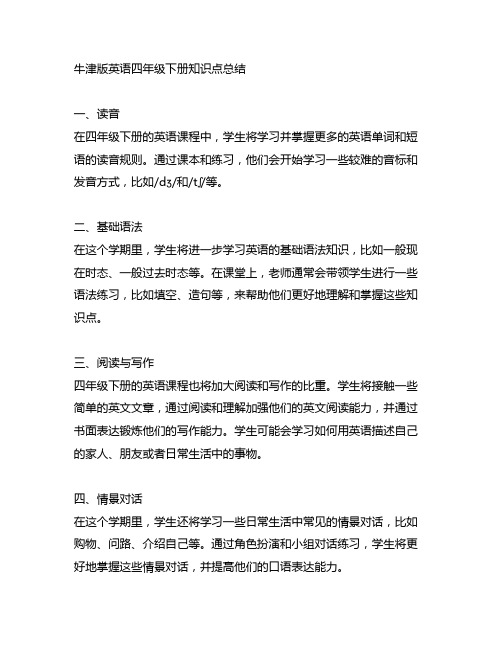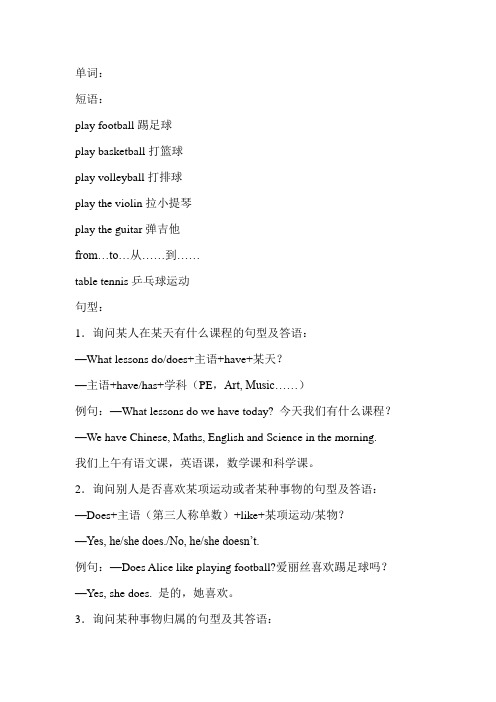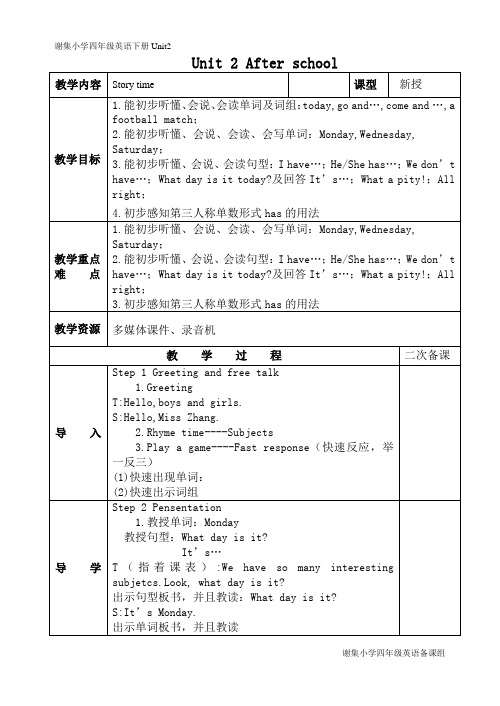[牛津中小学英语网]四下Unit2知识点
四年级下册英语讲义-Unit 2 How does it feel?知识点梳理含习题 牛津上海版

Unit 2 How does it feel? 知识点梳理含习题I.Words 单词1.hard adj. 坚硬的[例句] The table is hard.这个桌子很硬。
[反义词] soft柔软的[例句] This toy bear is very soft. 这个玩具熊很柔软。
2.soft adj. 柔软的[例句] This kind of pencil case is very soft. 这种笔袋很柔软。
3.rough adj. 粗糙的[例句] The paper feels rough.这纸摸起来很粗糙。
[反义词] smooth光滑的[例句] The wooden chair is big and smooth. 这把木椅子又大又光滑。
4.smooth adj. 光滑的[例句] The ball is smooth and soft. 这个球又光滑又软。
5.sharp adj. 锋利的[例词] a sharp knife 一把锋利的小刀 a sharp pencil 一支尖铅笔sharp teeth锋利的牙齿[例句] Be careful! The axe is sharp! 当心!这把斧子很锋利![反义词] blunt钝的;不锋利的These pencils are blunt.这些铅笔不尖了。
6.thin adj. 薄的;细的[例词] a thin boy 一个瘦弱的男孩 a thin book 一本薄书[例句] I have a thin notebook.我有一个薄的笔记本。
[反义词] thick 厚的;粗的[例句] Why don’ you wear your thick coat?你为什么不穿你的厚外套呢?7.knife n. 小刀[例句] I have a nice knife.我有一把很好的小刀。
Can you lend me your knife? 你能借给我你的小刀吗?[复数形式] knives8. pencil n. 铅笔[例句] My sister has a thin pencil. 我妹妹有一支细铅笔。
牛津版英语四年级下册知识点总结

牛津版英语四年级下册知识点总结摘要:一、牛津版英语四年级下册知识点概述1.课程教材简介2.知识点涵盖范围二、Unit 1 - Using My Five Senses1.单元主题2.核心词汇3.语法知识点三、Unit 2 - My Family1.单元主题2.核心词汇3.语法知识点四、Unit 3 - Food and drinks1.单元主题2.核心词汇3.语法知识点五、Unit 4 - Time1.单元主题2.核心词汇3.语法知识点六、Unit 5 - We Love Animals1.单元主题2.核心词汇3.语法知识点七、Unit 6 - My Holiday1.单元主题2.核心词汇3.语法知识点八、Unit 7 - My Day1.单元主题2.核心词汇3.语法知识点九、Unit 8 - Days of the Week1.单元主题2.核心词汇3.语法知识点十、Unit 9 - A Friend in Australia1.单元主题2.核心词汇3.语法知识点正文:一、牛津版英语四年级下册知识点概述牛津版英语四年级下册教材,以生动有趣的主题为核心,通过丰富的语言实践活动,帮助学生全面提高英语能力。
本册教材共包括九个单元,涉及的主题有:使用五官、家庭、食物和饮料、时间、动物、假期、日常生活、一周七天以及国际友谊。
二、Unit 1 - Using My Five Senses本单元的主题是“使用五官”。
学生将学习如何用英语描述视觉、听觉、嗅觉、味觉和触觉的体验。
通过本单元的学习,学生能够更好地理解和运用相关的词汇和表达。
三、Unit 2 - My Family本单元的主题是“我的家庭”。
学生将学习如何用英语介绍家庭成员、职业和家庭关系。
通过本单元的学习,学生能够更好地掌握家庭成员的词汇和相关的语法结构。
四、Unit 3 - Food and Drinks本单元的主题是“食物和饮料”。
学生将学习如何用英语描述各种食物和饮料的名称、味道和喜好。
小学英语四年级下册module4 unit2 will it be windy in beijing

• • • • • •
It will be windy in Beijing.北京将要刮风。 It will rain in Hangzhou.杭州将要下雨。 It will be sunny in Guangzhou.广州会天气晴朗。 It will be hot in Sanya.三亚将会天气炎热。 It will be cold in Yinchuan.银川天气会很冷。 It will snow in Shenyang.沈阳会下雪。
Module 4 Robots Unit 2 Will it be windy in Beijing?
sunny晴朗的
hot热的
windy 有风的
snow下雪
cold
rain下的
windy有风的
1
3 6
2
snow下雪
rain下雨
4
5
cold寒冷的
It will be windy in Beijing. It will rain in Hangzhou. It will be sunny in Guangzhou. Shenyang It will be hot in Sanya.
Will it be windy in Beijing? Will it be hot in Yinchuan? Will it rain in Hangzhou? Will it snow in Shenyang?
Yes, it will. No, it won’t. Yes, it will. Yes, it will.
4年级下册英语第2单元

4年级下册英语第2单元English:In the second unit of the fourth-grade English textbook, students typically learn about topics related to daily routines, such as waking up, brushing teeth, having breakfast, going to school, and returning home. The unit aims to enhance students' vocabulary related to daily activities and habits. Students may engage in various activities, including listening exercises, role-plays, and storytelling, to practice using the language in context. Through these activities, students not only learn new vocabulary but also develop their speaking and listening skills. Additionally, the unit may include grammar points related to present simple tense and adverbs of frequency, which are commonly used when discussing routines. By the end of the unit, students should be able to describe their daily routines fluently and confidently, both orally and in writing.中文翻译:在四年级英语教材的第二单元中,学生通常学习与日常生活相关的主题,例如起床、刷牙、吃早饭、上学和放学回家等。
四年级英语下册Module2知识梳理(牛津上海版试用本)

M2U1 Sports知识梳理一、重点词汇(需背默):sport运动、club俱乐部、play football踢足球、play table tennis打乒乓(= play ping pong)、play volleyball打排球、play badminton打羽毛球、play basketball 打篮球、poster海报、else其他的、join参加,加入、never从不、notice通知,注意、swimsuit游泳衣、goggles护目镜、remember记住、before在…之前(指时间,反义词是after)、healthy健康的、spare节省,空闲的、paint画画、line 线,排、mine我的(名词性物主代词)、smile微笑、french fries薯条、hobby 兴趣(复数hobbies)二、重点词组(需背默):badminton club羽毛球俱乐部、my favourite sport我最喜欢的运动、join the club 参加俱乐部、would like to do sth.=want to do sth. 想做某事、play…with sb.和某人一起玩……、talk with sb. 和某人交谈、get in your eyes进入你的眼睛、warmup exercises热身运动、go into the swimming pool进入游泳池、make sb. healthy使某人健康、enjoy oneself过得快乐、in a line在一条线上三、重点句型(需背默):1、Would you like to join the badminton club? Yes, I’d like to./Yes, I’d love to.你想参加羽毛球俱乐部吗?是的,我愿意。
(Would you like to …的问句语气比较客气)2、Would you like to join the volleyball club? I’d like to, but I can’t play volleyball. 你想参加排球俱乐部吗?我很想参加但是我不会打排球。
四年级下册英语知识点梳理-Module 2 牛津上海版(三起)

Unit 4 Subjects 一、重点单词二、重点句子1、What lessons do we have today?We have Chinese, Maths, English and Science in the morning.2、What subjects do you like? I like Maths and Science.3、This is our timetable for today. We have six lessons.4、From 11:20 a.m. to 1 p.m. , we have a lunch break.5、Art is fun.Unit 5 Sport一、重点单词二、重点句子1、I like playing football.2、Does Alice like playing football? Yes, she does.(No, she doesn’t)3、There’s a new football club in our school.4、Let’s tell Alice about the football club.5、Peter and I want to join the football club. Would you like to come with us? Sure .6、What does she like doing? She likes playing table tennis.What do you like doing? I like playing volleyball.subject lesson Chinese Maths English Science PE Musicfrom breaka.m p.m timetable from…to…fun Artsport football join tell about basketball volleyball usclub meet want sure table tennis play football play basketball play volleyballUnit 6 Music一、重点单词wonderful violin guitar whose piano city bag all mouse child come home a bag of gold magic gold play the guitar play the violin二、重点句子1、Whose guitar is it? It’s Joe’s guitar.2、Can you play the violin? No, I can’t.3、What can you play? I can play the guitar.4、There are many mice in the city. The children come home.5、I can help you .Give me a bag of gold.6、All the mice walk behind him. All the children walk behind him.Unit 4unit 5unit 6。
牛津版英语四年级下册知识点总结

牛津版英语四年级下册知识点总结一、读音在四年级下册的英语课程中,学生将学习并掌握更多的英语单词和短语的读音规则。
通过课本和练习,他们会开始学习一些较难的音标和发音方式,比如/dʒ/和/tʃ/等。
二、基础语法在这个学期里,学生将进一步学习英语的基础语法知识,比如一般现在时态、一般过去时态等。
在课堂上,老师通常会带领学生进行一些语法练习,比如填空、造句等,来帮助他们更好地理解和掌握这些知识点。
三、阅读与写作四年级下册的英语课程也将加大阅读和写作的比重。
学生将接触一些简单的英文文章,通过阅读和理解加强他们的英文阅读能力,并通过书面表达锻炼他们的写作能力。
学生可能会学习如何用英语描述自己的家人、朋友或者日常生活中的事物。
四、情景对话在这个学期里,学生还将学习一些日常生活中常见的情景对话,比如购物、问路、介绍自己等。
通过角色扮演和小组对话练习,学生将更好地掌握这些情景对话,并提高他们的口语表达能力。
总结回顾通过上述的学习内容,学生将在四年级下册的英语课程中得到全面的提高。
他们不仅将在词汇和语法上有所突破,还将在阅读、写作和口语表达方面有较大的发展。
这些都为他们进入更高一级的学习奠定了坚实的基础。
个人观点在学习英语的过程中,我认为多练习是非常重要的。
通过不断地练习阅读、写作和口语表达,学生才能真正地掌握和运用所学的知识。
老师在教学上也应该注重培养学生的自主学习能力,帮助他们在课堂之外进行更多的练习和实践。
以上是我对牛津版英语四年级下册知识点的总结和个人观点,希望能对你有所帮助。
在四年级下册的英语课程中,学生将继续学习并掌握更多的英语单词和短语的读音规则。
他们将进一步提高对英语音标和发音方式的理解和掌握。
通过听力练习和口语训练,他们将能够更加流利地表达和交流。
除了基础语法知识外,学生还将学习一些复杂的句型和语法结构。
他们将学习用一般现在时态表达将来的计划和安排,以及如何正确地使用不规则动词等。
通过语法练习和语法作业,他们将深入理解这些知识点。
牛津小学英语Unit2 Review

9.She likes____(play) the guitar.
10.____(not) open the door, please. 11. The girl sings____(well) than all of us. 12. Would you please____(read) the new words? 二,句型转换: 1.Mike runs faster than David.(划线提问) ___ ___ faster than David?
6.the, fly, than, buutterfly, bee, the,higher(连词成句)
三,根据上下文及首写字母提示完成对话。
A: Dad, I’m not h_____.
B: Do you n_____ help with your h_____? A: No, I’m not d___ w____ in EP.
2. What is he doing? B. No, she isn’t.
3. Does Nancy read better than Helen? C. All right.
4. Is Nancy fatter than Helen? D. Wang Bing. F.I’m cold.
5. Do you jump high? 7.Who’s taller than Mike?
(4).He runs as fast as you. 他跑的和你一样快。 否定句: (1)He isn’t stronger than you. (2) He isn’t as strong as you. 同意句:他不比你 壮。
(3)He doesn’t run faster than you.同义句:他
牛津版四年级英语下册课件 Module 2 Unit 1(2)

--Have you got a toy/pet?
--Yes, I’ve got a … It’s my…
--What colour is it? --It’s ______. --What’s its name? --Its name’s ….
1 Who are they? 2 What pet has Peter got? 3 What colour is it? 4 What’s its name? 5 What has Betty got? 6 Is it a pet?
(沪教牛津版)四年级英语下册课件
This is an animal. It has a
long tail. It has two big ears. It isn’t the chickens’ friend. It has two big eyes. It likes
bones. What is it?
Kitty
turtle
green
Tony
…
…
…
…
___ has a pet. It’s a ____. It’s ___(colour). Its name’s ___.
调查
cat turtle
black green
Ki pet?--Yes, I’ve got a … --What colour is it?--It’s ______. --What’s its name?--Its name’s ….
cat
black
Yes, I’ve got a ____. No, I haven’t.
I have got a d__o_g_. . It’s my pet. Its name is_B_r_o_w_n. ie.
四下牛津英语第二单元知识点归纳

Module 2 My favourite thingsRevisionUnit 1 Sports Look and say P17句型:1. ---Does…like…(doing)? ---Yes, …does. /No, …doesn’t.e.g. ---Does Alice like playing badminton?---Yes, she does! 4. Let me see. = Let me think. 让我想一想_______Yes, she likes. ×3. Who else would like to join? would like to do sth 想要做某事= Yes, she likes playing badminton. 2. There’s a new club in our school.There _____ some clubs in our school.are Would you like _______ with us? A. come B. to come C. comingto comeLook and learn P18词汇:play f oo tball play t a ble t e nnisplay v o lleyball play badmi nton play b a sketball/ʊ//e ɪ/ /e / /ɒ//ɪ/ /a:/ 注意点:球类前面不加定冠词the乐器类前面需要加定冠词theplay the piano play theguitar …Say and act P192. ---Would you like to come with us?---Oh, sure. I’d love to. = I would____句型:1. There’s a badminton club in our school. ___划线提问a: How many badminton club s are there in your school?Yes. / Of course.Look and read P20词汇:a swimsuit a swimming cap a pair of swimming gogglesget in your eyes do warm-up exercises go into the watergo into the swimming pool 句型:1.Swimming is fun.2.It makes you healthy and strong.3.Enjoy yourself in the swimming class!练习:1. Do some exercises before you go into the water.改成否定句Don’t do any exercises before you go into the water.2. I need a swimming suit. (对划线部分提问)What do you need?Unit 2 Cute animals Look and say P22句型:---What does … (do)? ---… (does)…e.g. Sam eats a large bowl of cat food every day. (对划线部分提问)What does Sam eat every day?The dogs like bones. (对划线部分提问)What do the dogs like?---What do … (do)? ---… (do)…Look and learn P23词汇:b o ne cat f oo d p a rr o t fi shd og food tor t o ise /əʊ//u ː/ /æ/ /ə//ʃ//ɒ//ɔː//ə/turtle句型:1.It smells nice.smell →V+ adje.g. The dinner smells good.The chicken smells delicious.2. Milly shakes the tree. (改为现在进行时)Milly is shaking the tree.词汇:wake up run away climb onto jump off go back to练习:1. The mouse is hungry. (对划线部分提问)How does the mouse feel?is sleeping2. A cat _________(sleep) in his basket. He is tired.3. The cat wakes up and ______ (see)a mouse.sees4. The mouse climbs _____ the door.ontoListen and enjoy P261. He wants to be a vet. want to be ... 想要从事某个职业want to do sth想要做某事He wants to have a pet.2. She took her dog to maths camp and taught him how to add.taketeachadd 加Can you add these numbers together?Unit 3 Home life Look and say P27句型:… am/is/are…(doing)I’m making a model plane.She is reading a book in her bedroom.We are having an English class now.练习:1. My mum is listening to the radio now .(对划线部分提问) What is your mum doing now?2. My father is cooking in the kitchen . (对划线部分提问) Where is your father cooking?Say and act P29词汇:Earth Hour turn off a fairy tale chat with sb练习:1. It is Earth Hour now. Many people turn off the lights. (改成否定句,句意不变)It is Earth Hour now. Many people don’t turn on the lights.2. Grandma usually tells us fairy tales. (改成一般疑问句,并作肯定回答)Does Grandma usually tell you fairy tales?Yes, she does.Look and read P30句型:1. The Chens are having a holiday on the beach in Sanya. The Chens 陈姓一家,指众多家庭成员,是复数。
新牛津沪教版四下module 2知识点汇总

单词:短语:play football踢足球play basketball打篮球play volleyball打排球play the violin拉小提琴play the guitar弹吉他from…to…从……到……table tennis乒乓球运动句型:1.询问某人在某天有什么课程的句型及答语:—What lessons do/does+主语+have+某天?—主语+have/has+学科(PE,Art, Music……)例句:—What lessons do we have today? 今天我们有什么课程?—We have Chinese, Maths, English and Science in the morning.我们上午有语文课,英语课,数学课和科学课。
2.询问别人是否喜欢某项运动或者某种事物的句型及答语:—Does+主语(第三人称单数)+like+某项运动/某物?—Yes, he/she does./No, he/she doesn’t.例句:—Does Alice like playing football?爱丽丝喜欢踢足球吗?—Yes, she does. 是的,她喜欢。
3.询问某种事物归属的句型及其答语:—Whose+物品+be动词(is/are)+it/this/that/these/those/they? —It’s / They’re+名词性物主代词(mine, his, hers…)/名词所有格. 例句:—Whose guitar is it? 它是谁的吉他?—It’s Joe’s guitar.它是乔的吉他。
单词:短语:play football踢足球play basketball打篮球play volleyball打排球play the violin拉小提琴play the guitar弹吉他from…to…从……到……table tennis乒乓球运动句型:1.询问某人在某天有什么课程的句型及答语:—What lessons do/does+主语+have+某天?—主语+have/has+学科(PE,Art, Music……)例句:—What lessons do we have today? 今天我们有什么课程?—We have Chinese, Maths, English and Science in the morning.我们上午有语文课,英语课,数学课和科学课。
小学英语PEP四年级下册第二单元语言知识点总汇

四年级下册第二单元语言知识点总汇Unit2WhatTimeIsIt一.重点o’clockn.breakfastn.lunchn.dinnern.Londonn.Sydneyn.writev.jumpv.dancev.runv.overadv./adj.kidn.readyadj.movien.Chinesen.numbern.papern.drawn.cutv.pla ten.on etwothreefourfive sixseveneightnineten1234567891 0二.重点短havebreakfast/lunch/dinner吃早/午/晚gotobed上床睡Goodnight!晚安!getup起床watchTV看Englishclass英gotoschool去上学gohome回家lookat看.class体育三.关于的表达Whattimei sit几点了Itis+数字+o’clock.Whattimei sit几点了Itissixo’clock.六点了。
四.“是做⋯⋯的了。
〞1.Itistimeforsth.是⋯⋯的了。
Itistimeforbreakfast/lunch/dinner. Itistimefordoingsth.是做⋯⋯的了。
Itistimeforhavingbreakfast.是吃早的了。
Itistimeforgoingtoschool.是上学的了。
Itistimeforgettingup.起床的了。
也可以表达Itistimetodosth. Itistimetohavebreakfast. Itistimetogotobed.Itistimetogetup.五.关于几点几分的表达十一到十九的表达方法eleve n 11twelve12thirteen13fourteen14fifteen15sixteen16seventeen17eighteen18nineteen19几十的表达方法t wentythirtyfortyfiftysixtyseventyeightyninety203040506070893.几十几的表达方法例如:二十一twentyone,三十二thirtytwo,四十五fortyfive⋯⋯:表达几十几,先念“几十〞,再念“几〞4.关于几点几分的表达方法先念,再念分,例如:5 :10五点十分five ten6 :15六点十五分sixfifteen8 :40八点四十eigh tforty⋯⋯。
小学四年级下册英语第二单元知识要点

2.其他常见的课程名词:
Chinese语文 maths 数学 art美术 history历史
3.短语:hurryup快点 getto到达 comeback回来;回家
gotowork去上班 gotosleep 上床睡觉
justaminute 稍等一会儿
三、核心句型
1.— Whattimeisit? 几点了?
— It’s6o’clock.六点了。
解读:“Whattimeisit?” 常用来询问具体时间,意思是“几点了?”回答时直接用“It’s+ 时间.”
举一反三:
—Whattimeisit?几点了?
—It’seighto’clock.八点了。
2.I43; 动词原形 + 其他.”意思是“该做……了”“到做……的时间了”。
举一反三:It’stimetogotoschool.该去上学了。
3.Let’sgototheplayground.我们去操场吧。
解读:这是提出建议或请求的句型。
举一反三:Let’splayfootball.我们踢足球吧。
Unit2Whattimeisit?
一、核心词汇
1.三餐名词:
breakfast早餐;早饭 lunch午餐;午饭
dinner(中午或晚上吃的)正餐
2.课程名词:English英语 ic音乐 PE体育
3.短语:
getup起床 gohome回家
gotoschool去上学 gotobed上床睡觉
二、了解词汇
解读:over 意思是“结束”。
3.Breakfastisready.早饭准备好了。
4.Justaminute.稍等一会儿。
2023四年级英语下册Unit2Afterschool知识点梳理译林牛津版

Unit 2知识点总结四会单词1. Tuesday星期二2. Wednesday星期三3. Thursday星期四4. Friday 星期五5. Saturday星期六6. Sunday星期日7. get up起床三会单词1.after school 放学后2. go 去3. What day is it today? 今天星期几?4. match比赛5. today今天6.What a pity!真遗憾!7. All right. 好的。
8. when 什么时候9. every每个 10. day 天四会词组1. what day星期几2. on Saturday 在星期六3. what lessons 什么课4. have Chinese and Maths有语文课和数学课5. get up 起床6. get up at five 五点起床7. on Tuesday 在星期二 8. on Friday 在星期五三会词组1. after school放学后2. go and play table tennis去打乒乓3. a football match 一场足球比赛4. have a football match有足球比赛5. a swimming lesson 一节游泳课6. have a swimming lesson 有游泳课7. don’t have any lessons 没有课 8. every day 每天9. at six 在六点 10. days of the week一周的星期11. make a week 组成一周 12. e and play table tennis 过来打乒乓四会三会句型1. I have a swimming lesson. 我有一节游泳课。
2. I have a football match today. 今天我有一场足球比赛。
3. Let’s go and play table tennis. 咱们去打乒乓吧。
牛津译林版-英语-四下-Unit 2 After school.

Consolidation
• 用have,has完成下列句子: • 1.I a basketball match today. • 2.Su Hai an Art lesson on Monday. • 3.We a Maths lesson on Wednesday morning. • 4.He a sister and a brother. • 5.Let me a look. • 6.She lunch at school every day.
场时由它专门负责。例如:
• Li Mei has a cat .李梅有一只猫。
• 3、have/ has两兄弟,都表示“有”来没问题,主语单 三用 has,其余一律用have。
• have的本事还有很多,这里先向大家介绍几个: • 与其他词构成短语: • have a look(at ) 看一看 • have a meeting 开会 • have a try 试一试 • have a cup of tea (coffee)喝杯茶(咖啡) • have breakfast (lunch /supper)吃早饭(午饭/晚饭) • 你明白了吗?
• 四年级刚接触语法,学生对have has ave/ Has的巧记方法
• 1、have它表示“有”,“拥有”。例如: • I have a bike .我有一辆自行车。 • We have English books .我们有英语书。 • 2、have它有个小弟弟叫has,当第三人称单数的主语出
• Boys and girls ,can you finish them by yourselves? • I hope you can. If you can,you will get six stars.
最新译林牛津版小学英语四年级下册unit2 第二课时重点习题及答案

Period 2【基础练习】一.根据所给字母补全单词并翻译。
1. W ___e___ d n _e_ s __d__ __a__ _y__ 星期三2. S _u_ _n_ d a_y__ 星期天3. T u__e__ s _d__ _a__ y 星期二4. T h _u__ __r__ s d a y 星期四5. F __r__ __i__ d a y 星期五6. g _e__ t u _p__ 起床二.词组互译。
1.什么课what lessons2.在六点 at six3.起床 get up4.在周六 on Saturday5.语文和数学 Chinese and Maths6.every day 每天三.根据中文提示补充句子。
1. What lessons do you have in the afternoon? –I have Chinese and Music . 在星期五上午你有什么课?我有语文课和音乐课。
2. What day is ittoday? –It’s Wednesday.I have a table tennis match .今天星期几?星期三。
我有一场乒乓赛。
3. We can play basketball on Sunday. We don’t have any lessons . 我们能在星期天打篮球。
我们没有任何课。
4. When do you go to school every day?-- At seven.你每天什么时候去学校?在七点。
5. I have a Maths lesson on Tuesday afternoon.Yang Ling has a swimming lesson .在周二下午我有一节数学课。
杨玲有一节游泳课。
【发展练习】四.根据上下文对话。
A: Get _up__,Sam!B:OK._what_ _time_ is it now?A: It’s seven o’clock. It’s _time__ __for__breakfast. B: Oh, I’m late. I must _go____ _to_ school now.A:__When_ do you have your first(第一节) lesson?B:__At_ eight o’clock.A:_What__ _lessons__ do you have this morning?B:I have English and PE。
牛津译林版英语4下unit2

教学内容
Story time
课型
新授
教学目标
1.能初步听懂、会说、会读单词及词组:today,go and…,come and…,a football match;
2.能初步听懂、会说、会读、会写单词:Monday,Wednesday,
Saturday;
3.能初步听懂、会说、会读句型:I have…;He/She has…;We don’t have…;What day is it today?及回答It’s…;What a pity!;All right;
S:It’s Monday.
出示单词板书,并且教读
T:We can write this word by this way too.
Learning tips:出示Monday缩写MON MON=Monday
What lessons do you have?
提示学生lessons课
S:We/I have…
引出课题Unit 2 After school,并且板书以及教读
教读after
出示afternoon-after在……之后
after school放学后
(2)Watch and answer(3)Read and match.
自读课文,并且连线
Mike have a swimming lesson
Su Hai have a football match on Wednesday.
1.Greeting
T:Hello,boys and girls.
S:Hello,Miss Zhang.
2.Say rhymes and readStory time
牛津译林版英语4下unit2

角色扮演
根据图片说出句子
T:You are Su Yang now.You can describe it by this way.
出示句型:I…at…,并且板书
at+时间在……点
Work in pairs
A:What day is it today?
B:It’s…
A:When do you…every day?
b.Read it together
Step 5 Homework
a.Copy the phrases
after school, go and play table tennis, what day
have a football match…
b.翻译句子
1.放学后我去打篮球。
2.她有许多的好书。
3.我们在星期六没有课。
引出课题Unit 2 After school,并且板书以及教读
教读after
出示afternoon-after在……之后
after school放学后
(2)Watch and answer(3)Read and match.
自读课文,并且连线
Mike have a swimming lesson
Su Hai have a football match on Wednesday.
Saturday;
2.能初步听懂、会说、会读句型:I have…;He/She has…;We don’t have…;What day is it today?及回答It’s…;What a pity!;All right;
3.初步感知第三人称单数形式has的用法
教学资源
多媒体课件、录音机
- 1、下载文档前请自行甄别文档内容的完整性,平台不提供额外的编辑、内容补充、找答案等附加服务。
- 2、"仅部分预览"的文档,不可在线预览部分如存在完整性等问题,可反馈申请退款(可完整预览的文档不适用该条件!)。
- 3、如文档侵犯您的权益,请联系客服反馈,我们会尽快为您处理(人工客服工作时间:9:00-18:30)。
四下Unit2知识点汇总
一、四会单词:1.Sunday 星期日2. Monday星期一3.Tuesday 星期二4.Wednesday 星期三
5.Thursday 星期四
6. Friday 星期五
7.Saturday 星期六
三会单词:1.go 去 2.match 比赛 3.today 今天 4.when 什么时候 5.every 每个 6.day 天四会词组
1. after school 放学后
2. what day 星期几 3 every day 每天
4.have a swimming lesson 有一堂游泳课
5. on Saturday 在星期六
6. all right好的
7.get up 起床8.on Tuesday morning/afternoon在周二早上/下午.
三会词组
1.have a football match 有一场足球赛
2.days of the week 一周的日子
3. play basketball打篮球
4. a skating lesson一堂溜冰课
5. on Thursday afternoon在周四下午
6.my cap 我的帽子
7. every morning每个早上8. at five在五点钟
9. how many days多少天10. make a week组成一个星期
11. . go and play table tennis 去打乒乓
三、四会句子:
1. What day is it today? It’s Wednesday. 今天星期几?星期三。
3. She has a swimming lesson too. 她也有一堂游泳课。
4. What a pity! 很遗憾!
5. What about Saturday? 周六怎么样?周六我们没有任何课。
6. All right. 好的。
三会句子
1. Let’s go and play table tennis. 让我们去打乒乓。
2. A: When do you get up every day? B: I get up at six. (At six.) 你每天几点起床?我六点起床.
3. I have an Art lesson on Tuesday afternoon.我在周二下午有一节美术课
4.There are seven days in a week.一周有7天
5.We don’t have any lessons on Saturday.我们在周六没有课.
四、知识点
have和has的区别:have用于第一人称(I, we),第二人称(you)和第三人称复数(they), has用于第三人称单数(he, she, it)或单数名词。
例句:I have an apple and he has two bananas.
You have a new English teacher.
It has two big eyes.
My sister has a doll.
Mike and Helen have a swimming lesson.。
